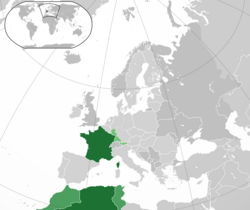This article needs additional citations for verification. (October 2022) |
French Republic République française (French) | |||||||||||||||||
|---|---|---|---|---|---|---|---|---|---|---|---|---|---|---|---|---|---|
| 1944–1946 | |||||||||||||||||
| Motto: "Liberté, Égalité, Fraternité" "Liberty, Equality, Fraternity" | |||||||||||||||||
| Anthem: "La Marseillaise" | |||||||||||||||||

| |||||||||||||||||
| Status | Provisional government | ||||||||||||||||
| Capital | Algiers (de facto, 3 June – 31 August 1944) Paris (de jure; de facto from 31 August 1944) | ||||||||||||||||
| Common languages | French | ||||||||||||||||
| Religion | Secular state
In Alsace-Lorraine: Roman CatholicismCalvinism Lutheranism Judaism | ||||||||||||||||
| Government | Tripartisme | ||||||||||||||||
| Chairman | |||||||||||||||||
• 1944–1946 | Charles de Gaulle | ||||||||||||||||
• 1946 | Félix Gouin | ||||||||||||||||
• 1946 | Georges Bidault | ||||||||||||||||
• 1946–1947 | Léon Blum | ||||||||||||||||
| Legislature | National Assembly | ||||||||||||||||
| Historical era | World War II | ||||||||||||||||
• Proclamation | 3 June 1944 | ||||||||||||||||
| 6 June 1944 | |||||||||||||||||
| 15 August 1944 | |||||||||||||||||
| 25 August 1944 | |||||||||||||||||
| 19 March 1945 | |||||||||||||||||
| 8 May 1945 | |||||||||||||||||
| 24 October 1945 | |||||||||||||||||
| 27 October 1946 | |||||||||||||||||
| Currency | French franc | ||||||||||||||||
| |||||||||||||||||
The Provisional Government of the French Republic (PGFR; French: Gouvernement provisoire de la République française (GPRF)) was the provisional government of Free France between 3 June 1944 and 27 October 1946, following the liberation of continental France after Operations Overlord and Dragoon, and lasting until the establishment of the French Fourth Republic. Its establishment marked the official restoration and re-establishment of a provisional French Republic, assuring continuity with the defunct French Third Republic.
It succeeded the French Committee of National Liberation (CFLN), which had been the provisional government of France in the overseas territories and metropolitan parts of the country (Algeria and Corsica) that had been liberated by the Free French. As the wartime government of France in 1944–1945, its main purposes were to handle the aftermath of the occupation of France and continue to wage war against Germany as one of the major Allies.
Its principal mission (in addition to the war) was to prepare the ground for a new constitutional order that resulted in the Fourth Republic. It also made several important reforms and political decisions, such as granting women the right to vote, founding the École nationale d'administration and laying the grounds of social security in France.

